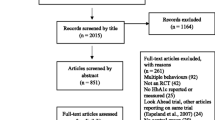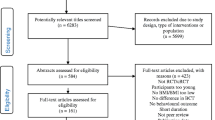Abstract
Background
Researchers must identify strategies to optimize the persuasiveness of messages used in public education campaigns encouraging fruit and vegetable (FV) intake.
Purpose
This study examined whether tailoring messages to individuals’ regulatory focus (RF), the tendency to be motivated by promotion versus prevention goals, increased the persuasiveness of messages encouraging greater FV intake.
Method
Participants (n = 518) completed an assessment of their RF and were randomly assigned to receive either prevention- or promotion-oriented messages. Messages were mailed 1 week, 2 months, and 3 months after the baseline interview. Follow-up assessments were conducted 1 and 4 months after the baseline assessment.
Results
Regression analyses revealed that at Month 4, the messages were somewhat more efficacious when congruent with participants’ RF.
Conclusion
RF may be a promising target for developing tailored messages promoting increased FV intake, and particularly for encouraging individuals to meet FV guidelines.


Similar content being viewed by others
References
Pomerleau J, Lock K, Knai C, McKee M. Interventions designed to increase adult fruit and vegetable intake can be effective: a systematic review of the literature. J Nutr. 2005; 135: 2486–2495.
Centers for Disease Control. Fruit and vegetable consumption among adults—United States, 2005. MMWR Recomm Rep. 2007; 56: 213–217.
Brawley LR, Latimer AE. Physical activity guides for Canadians: messaging strategies, realistic expectations for change, and evaluation. Can J Public Health. 2007; 98Suppl 2: s170–s184.
Cantor N, Kihlstrom JF. Personality and social intelligence. Englewood Cliffs: Prentice-Hall; 1987.
Latimer AE, Rivers SE, Rench TA et al. A field experiment testing the utility of regulatory fit messages for promoting physical activity. J Exp Soc Psycho. 2008; 44: 826–832.
Updegraff J, Sherman DK, Luyster FS, Mann T. The effects of message quality and congruency on perceptions of tailored health communications. J Exp Soc Psycho. 2007; 43: 249–257.
Spiegel S, Grant-Pillow H, Higgins ET. How regulatory fit enhances motivational strength during goal pursuit. Eur J Soc Psycho. 2004; 34: 39–54.
Higgins ET. Promotion and prevention: regulatory focus as a motivational principle. Adv Exp Soc Psycho. 1998; 30: 1–46.
Squiers L, Treiman K. The cancer information service research agenda. Available at http://cis.nci.nih.gov/research/research.html. Access verified March 31, 2008.
Williams-Piehota P, Pizarro J, Navarro Silvera S, Mowad L, Salovey P. Need for cognition and message complexity in motivating fruit and vegetable intake among callers to the Cancer Information Service. Health Commun. 2006; 19: 75–84.
Higgins ET, Friedman RS, Harlow RE, Idson LC, Ayduk ON, Taylor A. Achievement orientations from subjective histories of success: promotion pride versus prevention pride. Eur J of Soc Psycho. 2001; 31: 3–23.
Block G, Hartman AM, Dresser CM, Carroll MD, Gannon J, Gardner L. A data-based approach to diet questionnaire design and testing. Am J Epidemiol. 1986; 124: 453–469.
Ajzen I. From intentions to action a theory of planned behavior. In: Kuhl J, Beckmann J, eds. Action control: from cognition to behavior. Heidelberg: Springer; 1985: 11–39.
Serdula M, Coates R, Byers T, et al. Evaluation of a brief telephone questionnaire to estimate fruit and vegetable consumption in diverse study populations. Epidemiol. 1993; 4: 455–463.
Marcus AC, Heimendinger J, Wolfe P, et al. A randomized trial of a brief intervention to increase fruit and vegetable intake: a replication study among callers to the CIS. Prev Med. 2001; 33: 204–216.
Cohen J, Cohen P, West SG, Aiken LS. Applied and multiple regression/correlation analysis for the behavioral sciences. Mahwah: Lawrence Erlbaum; 2003.
Flay BR. Efficacy and effectiveness trials (and other phases of research) in the development of health promotion programs. Prev Med. 1986; 15: 451–474.
Tabachnick BG, Fidell LS. Using multivariate statistics. 4th ed. Boston: Allyn and Bacon; 2001.
Noar SM, Benac CN, Harris MS. Does tailoring matter? Meta-analytic review of tailored print health behavior change interventions. Psycho Bull. 2007; 133: 673–693.
Prochaska JO, DiClemente CC. Stages and processes of self-change of smoking: toward an integrative model of change. J of Consult and Clin Psycho. 1983; 51: 390–395.
Steinhauser KE, Clipp EC, Hays JC, et al. Identifying, recruiting, and retaining seriously-ill patients and their caregivers in longitudinal research. Palliat Med. 2006; 20: 745–54.
Acknowledgement of Research Support
Research reported in this article was funded by the National Cancer Institute through a grant to Peter Salovey (R01-CA68427) and a contract to the Yale Cancer Center (NO2-CO-01002-75).
Author information
Authors and Affiliations
Corresponding authors
About this article
Cite this article
Latimer, A.E., Williams-Piehota, P., Katulak, N.A. et al. Promoting Fruit and Vegetable Intake through Messages Tailored to Individual Differences in Regulatory Focus. ann. behav. med. 35, 363–369 (2008). https://doi.org/10.1007/s12160-008-9039-6
Received:
Published:
Issue Date:
DOI: https://doi.org/10.1007/s12160-008-9039-6




